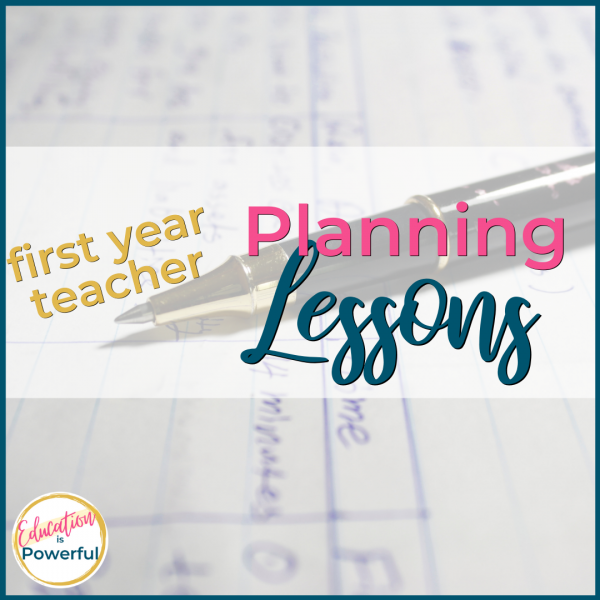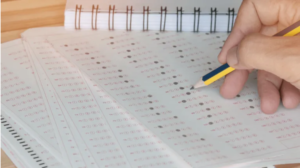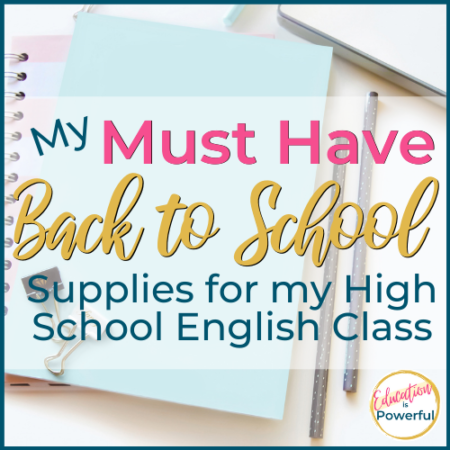Planning lessons is one of the hardest things for a new teacher to get right. It is something that we practice in school, but once you are teaching every single day for every single period, you don’t know what it is really like and what is essential.
Teach Your Passion
One of the first things I want to impress on new teachers, and what I wish I knew as a new teacher, was that we should have the freedom to teach what we are passionate about. I know that for especially for secondary content teachers, that when we are able to teach our passion, we are better teachers.
However, the reality is that we can’t do this all the time, so I want you to be able to teach your passion
1. At the start of the year.
When we teach what we are passionate about as our very first unit, students get to know us and we can connect with them. Not to mention it is way less boring and has the opportunity to hook our students.
2. At the end of the year
When we end our year with what we are passionate about it can help you get through those last weeks, after testing, when everyone is counting down to summer vacation.
When Planning Lessons Put the Educational Learning Load on Students
If it feels like you are spending hours at home lesson planning every night, then you are planning wrong. Harry Wong, who wrote The First Days of School shares the story of coming home exhausted and students coming home with tons of energy. We know that those who are doing the most work are the ones who are doing the most learning. So let your students do the most work and they will learn more.
One way you can do this is to be a facilitator, rather than a dispenser of knowledge. Another way to think of this is to do a Guide on the Side, rather than the Sage on the Stage. You know you are doing this when you are teaching from powerpoints all the time, which students quietly and dutifully take notes.
Some ideas are to use jigsaws and collaborative learning or project based learning activities.
Plan First, Grade Second
One of the first thing I did to be able to leave at contract time was to use my planning time wisely. This meant that I planned my lessons first.
There were two main sections of my lesson plan that I focussed on: content or curriculum and then strategies – what are students going to be doing (remember put the educational load on them). I’d love to send you this template, so you can see how I formatted this for yourself – it is an editable Google Doc.
The last thing I focussed on was grading. In all honesty, you really need to ask yourself the question – Do I need to grade this?
I was mentoring a new teacher who would stay every night to grade his starters that were worth 3 points. The strategy he used was amazing – students got 3 review questions at the start of class and in real time he would show the class results and review the material right then if needed.
But he felt that he had to grade the starter or else students wouldn’t take it seriously. But the program he used listed each student individually by question – he couldn’t get a report with all three questions together. But did the 3 points really matter in the end? The goal and the objective was to review material if needed – not to assign points. I think he underestimated how much students like to be right. When he stopped doing that, he was able to shave off 2 hours of after school time.
But the main reason you want to work on your lesson plan more than grading is that what happens during class is more effective than points given on an assignment. So spend you time and energy there, so that we can focus on student learning, rather than student grades.
Work With Your PLC
When planning your lessons, you want to make sure that you get help! Teachers who have experience teaching what you are teaching can help you. In my career I have met very few teachers who refuse to help a new teacher – either a new teacher to the profess or a new teacher to the school.
Working with your PLC to lesson plan also gives you the opportunity to learn from others. I wish more teachers had the chance to go in and see their colleagues teach. I have had the opportunity as a new teacher coach to watch so many teacher do amazing things in their own classrooms and it has made me a better teacher.
The PLC work can also help you gain perspective on student success and failures. You may give a test and several students fail it. Your PLC can help you to know if all students struggled with that concept or if it was just you. Sometimes it is you and you need to change your plan. But sometimes it isn’t you. My sophomores always struggle with explaining evidence when they come to me. I know that is a gap that I have to fill and work on throughout the entire year. The perspective of working in a PLC is a game-changer!
Don’t forget that lesson planning is core to what we do every day as a teacher. Make it a priority!


